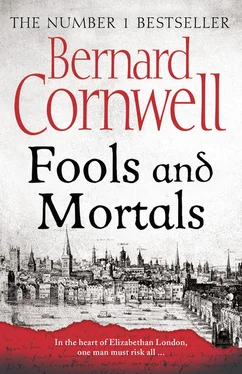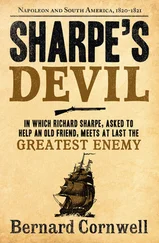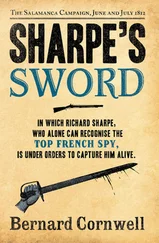1 ...8 9 10 12 13 14 ...19 ‘I’m no sailor,’ I said. I had seen the sea once, and that once was enough.
‘No, you’re not,’ Venables said forcefully, ‘you’re a player and a very good one.’
‘Am I?’ I asked, sounding like Simon Willoughby.
‘You have grace onstage, you have been blessed with beauty, you speak clearly.’
‘Thank you, sir,’ I said in Uashti’s voice, ‘but I have no beard.’
‘You don’t need a beard,’ he said, and took my arm again, steering me towards the front of the stage.
‘I can’t grow one yet,’ I said, ‘because I still have to play the women’s parts. But James has promised me a man’s part soon.’
He let go of my arm. ‘James Burbage has promised you a man’s part?’ his tone was surprisingly harsh.
‘Yes, sir.’
‘What part?’
‘I don’t know.’
‘And in what play?’
He still spoke harshly, and I remembered my brother saying that it was easy to underestimate the Reverend William Venables. ‘He might appear a light fool,’ my brother had said, ‘but he keeps his place in the royal court, and Her Majesty likes neither clergymen nor fools.’
‘She doesn’t like clergymen?’ I had asked, surprised.
‘After the way her sister’s bishops treated her? She despises them. She believes churchmen stir up unnecessary trouble, and she hates unnecessary trouble. But she likes Venables. He amuses her.’
The Very Reverend William Venables was not amusing me. He was gripping my elbow again and leaning too close. I tried to pull away, but he kept hold of me. ‘What play?’ he demanded a second time.
‘It’s a wedding play,’ I told him, ‘for the Lord Chamberlain’s granddaughter.’
‘Ah! Of course.’ He relaxed his grip and smiled at me. ‘A new play, how exciting! Do you know who is writing it?’
‘My brother, sir.’
‘Of course he is,’ he said, still smiling. ‘Tell me, Richard. Have you heard of Lancelot Torrens?’
‘No, sir.’
‘Lancelot Torrens is the third Earl of Lechlade and a quite remarkable young man.’ I sensed that this was why he had drawn me out onto the empty stage where no one could overhear what we said, and that impression was intensified when Venables lowered his voice. ‘His grand-daddy became rich under gross Henry, gave the fat king money, and suddenly a leather merchant from Bristol is translated into an earl. Almighty God moves in a stupefying way sometimes, but I must confess young Lancelot graces the rank, and young Lancelot also has money.’ He paused, smiling slyly at me. ‘Do you like money, young Richard?’
‘Who doesn’t?’
‘Your brother tells me you’re a thief.’
I blushed at that. ‘It’s not true, sir,’ I said, too forcefully.
‘What young man isn’t? And onstage you steal our hearts!’ He smiled brightly. ‘You are good.’
‘Thank you,’ I said awkwardly.
‘And Lancelot Torrens, third Earl of Lechlade, would like to possess a company of actors, and the young man has money, a great deal of money. He would, I think, regard you as a most valued member of any company that was fortunate enough to boast of his patronage.’ He watched me, waiting for me to speak, but I had no idea what to say. ‘He knows of you,’ he added coyly.
I laughed at that. ‘I’m sure he doesn’t, sir.’
‘And I assure you he does, or rather his man of business knows of you. I supplied him with a list of players fit for his new playhouse.’
‘He has a playhouse?’
‘Of course! A company needs a playhouse, and only the finest will satisfy young Lancelot. Who do you think is paying for that monstrosity on Bankside?’
I tried to remember the name of the man building the new playhouse, the one James Burbage had been worried I might have talked to. ‘Francis Langley?’
‘Langley has money, but if he owned every brothel in Southwark it wouldn’t be sufficient. The little earl is paying.’
‘Little?’ I asked.
‘He has beauty, but lacks stature,’ the reverend explained, ‘while you, my dear, have both.’
I had a sudden memory of Simon Willoughby being pinned against the palace courtyard wall as the rain fell. ‘The earl,’ I said, then hesitated.
‘Richard?’
‘Is he fair-haired?’
‘Fair-haired?’ The Reverend William Venables smiled seraphically. ‘I should rather say that his locks were spun from the palest gold on the distaff of an angel.’ So it was the Earl of Lechlade who had accosted Simon that night? I could not be sure, of course, but it seemed most likely. ‘Why do you ask?’ the reverend demanded.
‘I wondered if I’d seen him, that’s all.’
‘You’d remember him if you had.’
‘Are you writing for him?’ I asked.
Venables looked hurt. ‘Your brother won’t stage any more plays of mine. Hester brings in the crowds, but will he perform Susannah and the Elders ? No! Or David and Bathsheba ? No!’
‘And Langley will?’ I asked.
‘Francis and the earl recognise quality,’ he said stiffly, ‘but they need other plays.’ He turned to look me straight in the eyes. ‘If you were to take Langley your brother’s new play I think you would find that you never need steal again!’
I just stared at him, too shocked to speak.
‘You should talk to Langley,’ the reverend said.
I did not know what to say. His proposal was so dishonest, so shocking, that I could not find the words. A playhouse’s scripts are among its most precious possessions because if another company could find a copy of a play then that company could present that play. Sometimes, when plague closed the playhouses, a company would publish one of its scripts to make some money, and then that play became the property of anyone who wanted it. That was how we had secured The Seven Deadly Sins . We needed to pay no money to its author, we just performed it when we liked, though too many performances would soon see an empty playhouse. If the Earl of Lechlade’s company came by a copy of the wedding play, or of the new play set in Verona that my brother was still writing, they could perform the plays and so steal our audience. A play script is precious, worth eight, nine, or ten pounds each, and so they are locked safely away. To steal one would be to betray the company, and so I hesitated, stammered, and finally evaded an answer by saying I had promised to stay with my brother’s company through the winter.
‘Promises in playhouses,’ the Reverend William Venables said airily, ‘are like kisses on May Day. They don’t count. Go and talk to Langley.’
Because the earl had money.
And I had none.
I did not go to find Francis Langley. London might be a mighty city, but the players in the playhouses all know each other. I feared that if James Burbage or my brother discovered I had been talking with Langley, then their promise of a man’s part in the new play might vanish like a summer mist. I was tempted, but for once I did not yield to temptation.
Then the Percies came on Monday.
We call them the Percies, but they are really Her Majesty’s Pursuivants, black-dressed retainers whose job is to hunt down and root out those Roman Catholics who would slaughter the Queen and take England back to the Roman church. Their prize quarry are the Jesuits, but any Roman priest or anyone who shelters such a priest can expect the Percies to come calling and on the Monday they came to the Theatre.
We were rehearsing the Comedy , or, to give the play its full title, The Comedy of Errors . We knew the play well, but on Sunday George Bryan had tripped over the lintel of Saint Leonard’s church and broken his nose. ‘We are cursed,’ my brother had said, delivering the news, ‘first Augustine, now George.’
Читать дальше












